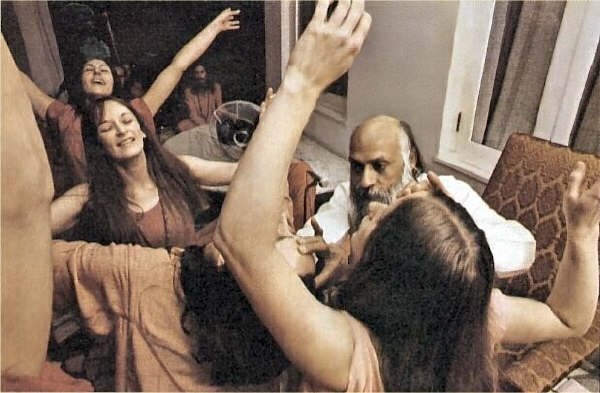I used to know a very strange man, Mahatma Bhagwandin. In India there were only two mahatmas: Mahatma Gandhi and Mahatma Bhagwandin. I am absolutely against Mahatma Gandhi on every point. Sometime I am going to take care of him!
But with Mahatma Bhagwandin I had a deep friendship. He was old, I was very young, just a student in the university when we met. He had come to give a talk in the university where I was a student, and he was talking and quoting from the scriptures, and he was a very great orator of his time.
But I have always been a difficult person. I stood up in the middle, and I said to him, “Stop for a moment.” He looked at me. I said, “Do you have anything to say on your own authority, or are you still going to quote from the scriptures?”
There was a great silence. The vice-chancellor felt bad; he knew that I could not resist the temptation.
Mahatma Bhagwandin was shocked. For the first time somebody had interrupted him in the middle. But he was an honest man, and he said, “You are right. I don’t have anything to say on my own authority.” That was the beginning of a great friendship of a young man with an old man.
We used to meet often. He used to stay with me in my house, and I used to stay with him in his house. It was not far away, it was only six hours by car. Any moment I wanted to go there, I would simply drive from Jabalpur to Nagpur; he lived in Nagpur.
We forgot completely that I was too young and he was too old. Even his host — because he had no home, he was a sannyasin, so he was living with a friend — even his host used to say, “It is a strange kind of friendship. You are so young, he is just going to die … but when you both talk together, even we who listen forget the difference between your ages.”
And by chance, the day he died I was present just a few hours before. I was coming from Chaanda, and just in the train one man, Kamalnayan Bajaj … He was the son of Jamanalal Bajaj, and Jamanalal Bajaj was the host of Mahatma Gandhi; he had taken him from Sabarmati, Ahmedabad, to Wardha. Wardha is just between Chaanda and Nagpur.
I was coming from Chaanda. On the station of Wardha, Kamalnayan entered into my compartment. He was a member of parliament. He told me, “Do you know that Mahatma Bhagwandin is very seriously ill?”
I said, “I had no idea.”
He said, “I am going to see him.”
I said, “I will then get down in Nagpur.” I had not intended to get down in Nagpur, I was going directly by train to Jabalpur.
So I got down, I went to see him, and I could not believe my eyes. I had not seen him for almost one year. He had become just a skeleton, just skin and bones, nothing else was left, and he was continuously coughing, coughing blood.
He looked at me and he smiled. He said, “This was my last wish, that if existence has any compassion on me, somehow I would like to see you. That was my continuous heartfelt desire this last day. It is a miracle: you have come. I wanted to say something to you, because I know I am not going to stay much longer, maybe a few hours.” And, in fact, after three hours he died.
He said to me, “You had asked a question while you were a student many years ago in the university, and I had to confess before thousands of students and hundreds of professors that I didn’t have anything to say on my own authority.
“I want you to know that I still don’t have anything of my own to say. I remained a scholar. I am dying in deep misery. I did not listen to you, I argued and argued and quoted scriptures, and never took the point although I felt you were right. But my age, my prestige, prevented me from asking you how to know it, how to get to it. It was a simple question and you were always available, but because I never asked, you never said anything. We discussed and discussed, but that was all intellectual.”
I said, “I was waiting. Without your being thirsty for it … it is not possible for anyone. You can take the horse to the river, but you cannot force the horse to drink the water.
“I have tried in every way to take you to the river. That’s the end of the master’s work. Now the river is ahead of you: if you are thirsty, drink; if you don’t feel thirsty, I am helpless.”
He had tears in his eyes, tears of a long life wasted in words. Because of his scholarship he has been called Mahatma, great soul, but he had no idea of any soul as an experience.
This country is too full of knowledge, too much burdened with scholarship, too much dominated by the priests.
One thing he said, the last thing before I left him. He said to me, “If the crowd agrees with you, know you are wrong. Just remember it as advice from an old friend. If the crowd disagrees with you, there is a chance of your being right.”
The crowd has never been right, hence you don’t see the Indian crowd here. You see individuals from all over the world, and a few individuals from India too — but this is not a crowd. This is a meeting place of seekers. You have come on your own in search.
India is too egoistic because it has all the great scriptures, and all the great priests who parrot-like go on repeating great words — and they are satisfied with those words. They will die a miserable death like Mahatma Bhagwandin.
OSHO
from : Christianity : The Deadliest Poison and Zen The Antidote to All Poisons Ch. 6



